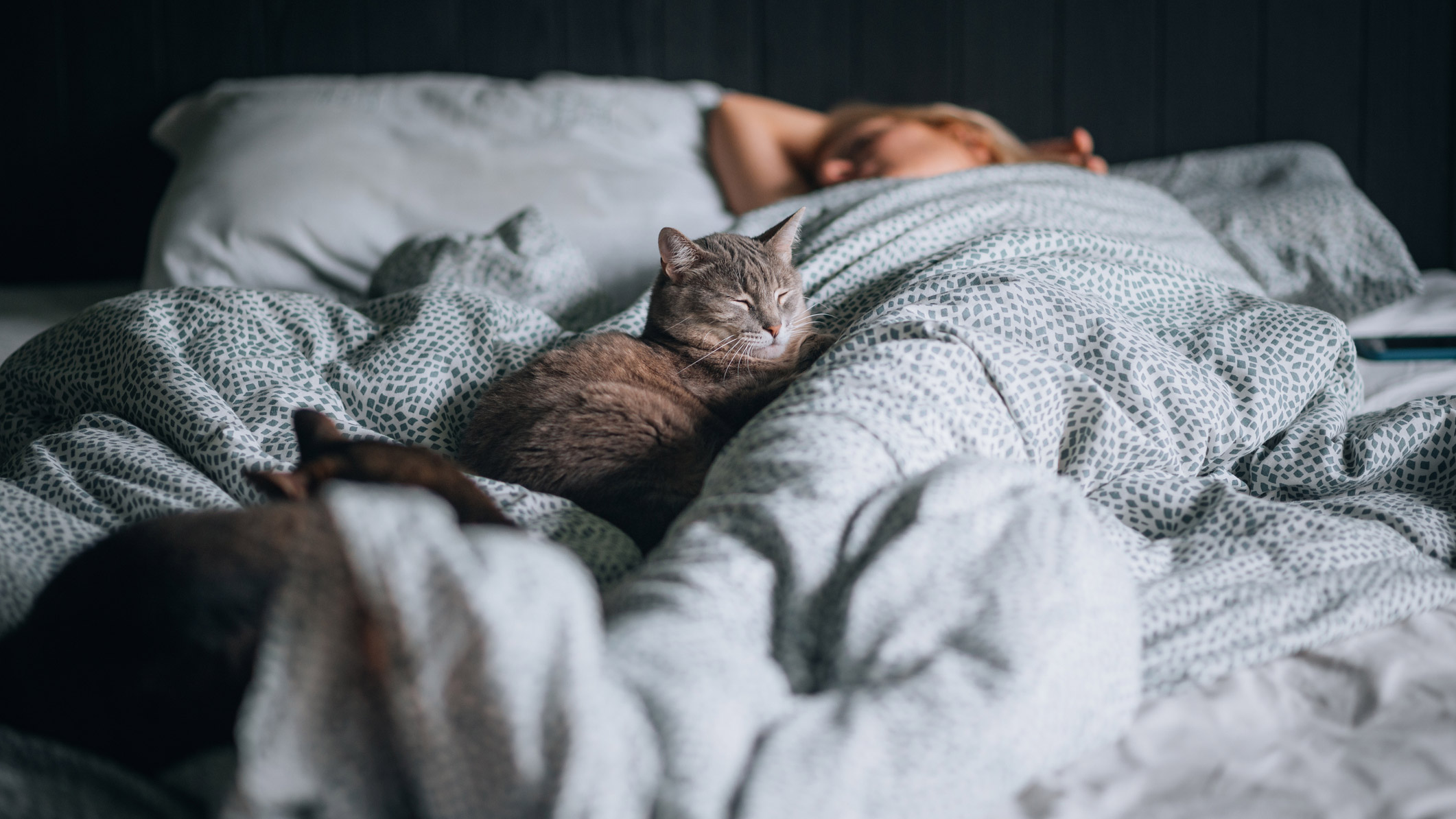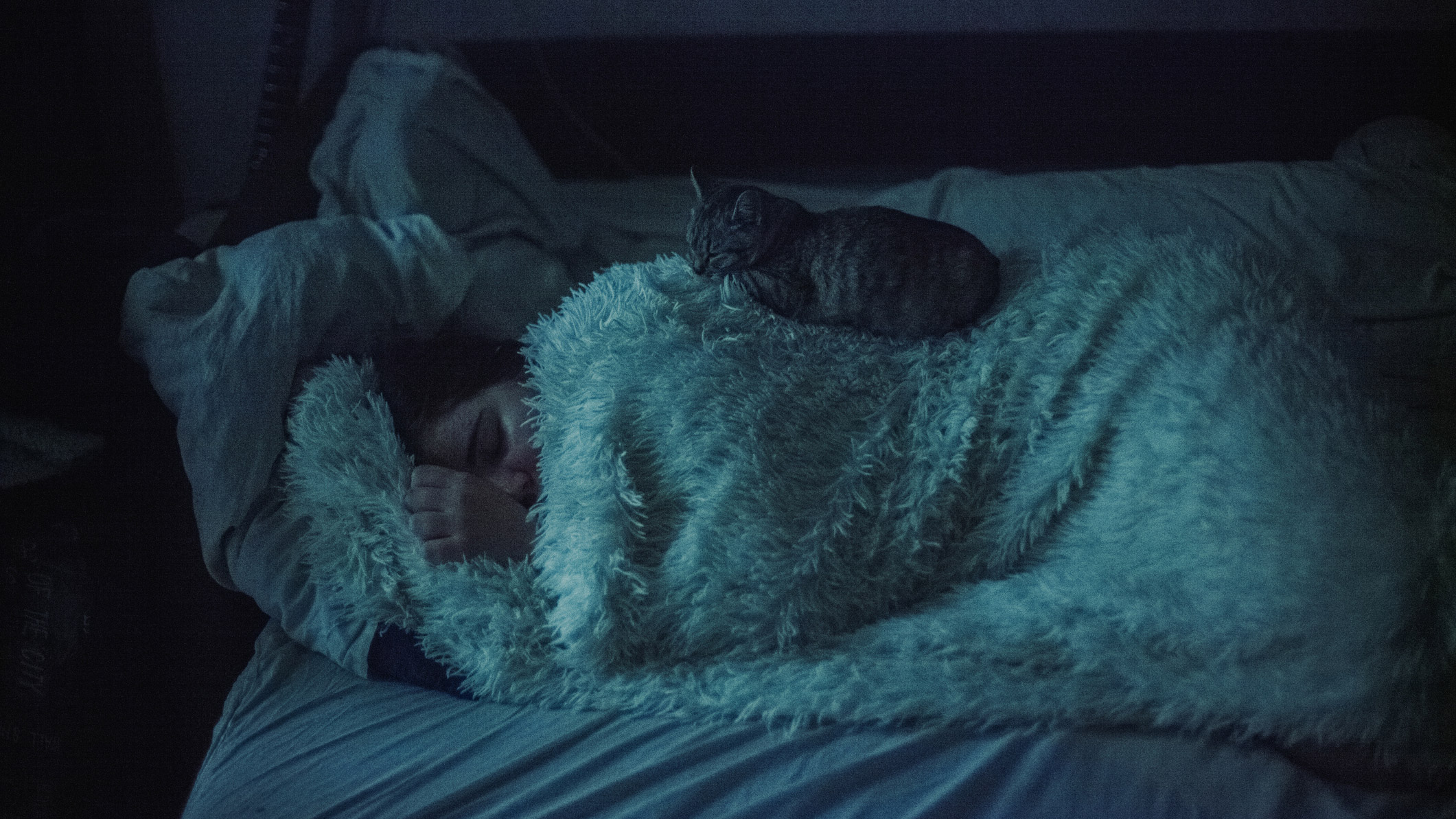Letting your pet sleep in your bed with you might actually improve your sleep
We got a sleep expert's take on the pros and cons of pets in bed

Should you let your pet sleep in your bed with you? Considering that 66% of US households and 53% of UK adults own a pet, it's probably a question that you've asked yourself, and it can be quite a divisive issue. Some people are quite firmly of the opinion that pets stay off the bed at all times. At a guess, I'd say those people aren't cat owners, because cats will sleep wherever they want and there's nothing you can do about it.
Me, I'm generally good with sharing a bed with a pet – within reason, of course, by which I mean as long as they stay on top of the covers. Pets under the duvet is an absolute red line for me. Most nights, my partner and I are joined by one of our cats, and it's mostly fine, even if it means that I often find myself shoved a little too close to the edge of the bed for comfort.

If you've treated yourself to the best mattress, why shouldn't your pet feel the benefit of it too? A YouGov sleep survey found that over half of Britons allow their pets to sleep in bed with them, and the good news is that according to sleep expert Ashley Hainsworth of Bed Kingdom, that's fine, mostly. He's outlined four benefits you'll get from letting your pet on the bed at night, as well as three reasons why it might not be such a great idea.
Why you should let your pet sleep on your bed...
1. You'll asleep faster
If you struggle to get to sleep there are any number of ways you can try to improve matters, such as implementing a regular bedtime routine. But simply allowing your dog or cat onto the bed at night could be the only sleep hack you need.
"Falling asleep with your pet beside you can increase endorphin levels," says Ashley, "thus reducing stress and anxiety. In turn, this can help you fall asleep quicker, which is ideal if you’re someone who has difficulty getting some well-needed shuteye."
2. Security and comfort
If you live alone, says Ashley, sleeping with a pet can increase your sense of security and improve your levels of comfort when you go to bed. "Feeling safe and relaxed is extremely important," he adds, "and can drastically improve your sleep quality."
3. Extra warmth
When it's cold at night, a cosy pet can be a much more cost-effective way to keep warm than a keeping the heating on overnight or switching on an electric blanket. And, says Ashley, there are other sleep benefits.
Get daily insight, inspiration and deals in your inbox
Sign up for breaking news, reviews, opinion, top tech deals, and more.

"A key factor in determining whether you have a good night's sleep is body temperature," he says. "If you feel the cold more than the average person, cuddling up to a warm pet at night may be precisely what you need to drift off."
4. Better bonding
"Sleeping with your pet can significantly increase your bond and strengthen your relationship," says Ashley, and I absolutely agree with him here; Marmalade came to us as a very scared boy who wanted nothing to do with people, and it took him a good couple of years to risk climbing onto the bed with us at night. Now he's on our bed most nights, and he's a much more settled and sociable cat in general.

Ashley also notes that sharing a bed with your pet means you can learn to read their body language better, and simply be more in tune with one another, which can improve their behaviour and overall happiness as a result.
...and why you maybe shouldn't
1. Disrupted sleep
I'm fortunate in that Marmalade settles down at night and stays there until the morning; you might not be so lucky. "Our pets are living beings and therefore, move around a lot," says Ashley, "You may find that your pet is finding it difficult to settle and won’t stay still, so their constant movement and rearranging may disrupt your sleep."
He suggests that one way to combat this is to invest in a bed large enough to accommodate you and your pets (our guide to the best king size mattress can help you with this). This allows for any movement that does occur to go unnoticed.
2. Hygiene
The issue of hygiene is the most likely reason why many people won't allow pets on the bed, and it's a fair point. Our pets can carry dirt and other unwanted guests in their fur, such as fleas, ticks and lice, and the last thing you want is for those to end up in your bed.

"To tackle this, keep up to date with your pet's vaccinations and make sure they are clean after being outside," suggests Ashley, "You should also wash your bedding more frequently if you decide to let your pets sleep with you, specifically every three to four days."
3. Behavioural issues
The big downside to allowing your pet to share your bed is how it'll react when, for whatever reason, you might not want it in the bedroom with you. "There are varying arguments as to whether letting your pet sleep with you causes them separation anxiety," says Ashley,
"If you notice any problem behaviors, consult a trainer or an animal behaviorist. Some signs to look out for include an increase in destructive behavior, extreme vocalizing like howling, barking or whining when you leave, and toileting inside the house, even if they are trained."
A professional writer with over a quarter of a century's experience, Jim has been covering mattress and sleep-related subjects for TechRadar, Tom's Guide and T3 over the past few years, gathering an in-depth knowledge of the workings of the mattress industry along the way. Previously Jim has covered a wide variety of subjects, working widely in the tech and gaming sectors, and more recently covering the design and wellness industries.
